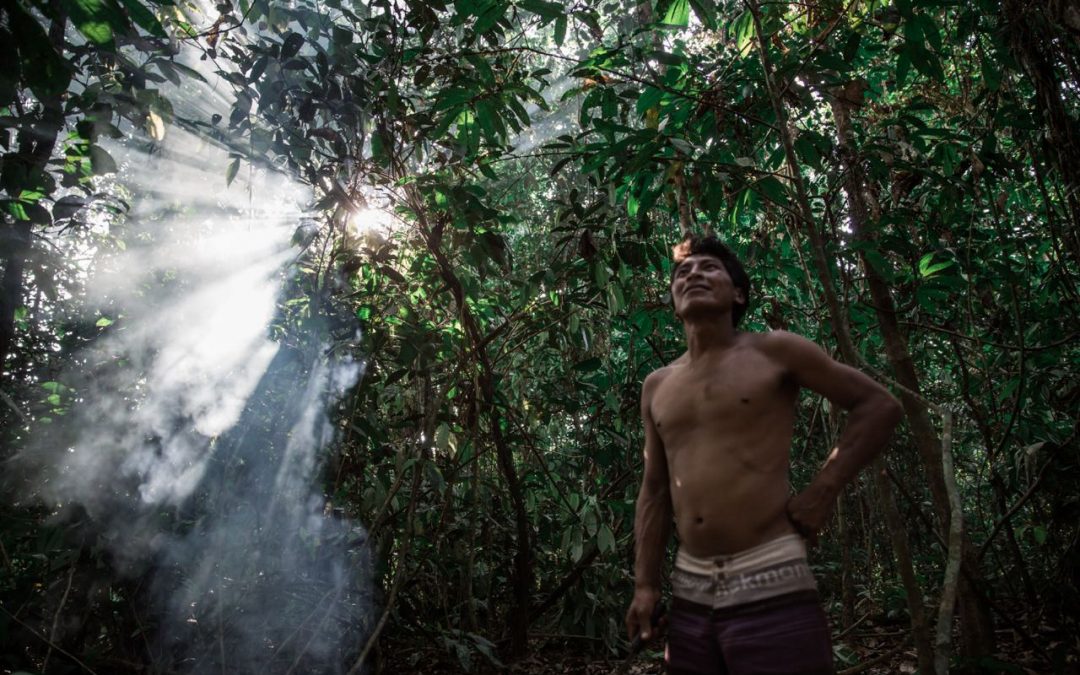
29/Oct/2021
We, Indigenous Peoples of the Brazilian Amazon, have long observed climate change and its effects due to our relationship with the Mother Earth. From her, we receive all our sustenance needs in addition to the explanations for the phenomena that affects the lives of all living and cosmological beings.
In Brazil, climate crisis is directly related to the greed over Indigenous lands and the natural resources therein, coupled with the ongoing regression and rollback of Indigenous and environmental safeguards and rights. It is essential to think seriously about the need to respect the socio-biodiversity present in our territories, especially at this time that we are living in, in which a virus stopped the world and affected the routines of billions of people from all social classes and different cultures. However, the current government in Brazil is acting in lethal ways with anti-environment, anti-climate, and anti-Indigenous policies. Our territories, which belong to us by our Constitutional right, are being invaded by illegal miners and loggers; villages are surrounded by large-scale cattle and soybean farms; rivers are being contaminated with pesticides and mercury; and the Amazon rainforest is burning to ashes. Yet, governments and funds that operate internationally continue to finance this unbridled greed, this economy of destruction that kills and destroys lives and the planet.
Now more than ever, everyone needs to hear our call, that we Indigenous Peoples have been warning for centuries based on our traditional knowledge that guides our way of seeing and understanding the world. It is in this context that we once again call attention to the need to construct a climate justice that is inclusive and participatory with respect to our cosmologies, our safeguards, and our territories. It is necessary to go beyond the targets established in international agreements and begin to consider the vital role that we play in this process. All this in consideration of social and environmental responsibility.
We have now reached the tipping point. The recent report released by the Intergovernmental Panel on Climate Change, titled “Climate Change 2021: the Physical Science Basis,” clearly demonstrates that man-made changes to the climate are irrefutable, irreversible, and will worsen in the coming years and decades if we do not have practical actions to change the narrative of the climatic, environmental, and societal crisis. Likewise, even if we zeroed greenhouse gas emissions, we would already have had a significant increase in global temperatures with catastrophic effects.
There is no other way forward but to recognize, strengthen, and promote the very important role played by us, Indigenous Peoples, within our territories. For us, talking about climate justice is precisely thinking about the fate of the present and future generations, as well as those who have chosen different forms of social structures like the Indigenous Peoples in isolation or recent contact who live in the Amazon. This is related to the need of respecting diversity. Indigenous cosmology makes us understand the signs of Mother Earth, imposing the duty to recognize ecocide. The rivers, lakes, animals, forests, and all cosmological beings that live within are subjects of rights just like us human beings, and their rights must be respected. Therefore, when talking about climate crisis, it requires recognizing the important role of Indigenous lands, and our own, who give our lives to protect the forests and its biodiversity, in balancing the climate and benefiting all Humanity.
Yet, there exists a practical solution that we Indigenous Peoples have been pointing out. That is, demarcating our territories, shifting the production system, planting more trees, ending reliance on fossil fuels, and reducing the pressure on the Earth’s natural resources. This must be a commitment from everyone, including governments, the private sector, and individual people.
Protected territories and respected rights are the solution. We cannot let ourselves be seduced by the idea of carbon markets, false solutions based only on nature and financing mechanisms that is not consistent with our reality. Rather, we offer alternatives based on our traditional knowledge, which can be associated with technological innovations. For example, agricultural practices must be linked to food security. Therefore, we call attention to the joint responsibility of all stakeholders involved. Corporations and governments are responsible for the destruction in the Brazilian Amazon; however, criticism alone is not enough. Now more than ever, much more is needed to adopt measures to safeguard ecological interests.
It is urgent and essential to strengthen Indigenous funds and financing mechanisms that correspond to our reality,as the Brazilian Amazon Indigenous Fund – Podaali. Such resources should promote the implementation of Indigenous Peoples’ life plans in addition to socio-environmental policies. Nonetheless, none of these efforts will have an effect until all Indigenous lands are demarcated, 80% of the Amazon biome is protected, and all stakeholders have committed to ambitious and achievable goals. In this way, it becomes clear that it is necessary to change the entire current political and economic system.
The time has come for the Indigenous Peoples of the Brazilian Amazon, through the Coordination of the Indigenous Organizations of the Brazilian Amazon (COIAB) – which is the largest Indigenous organization in Brazil, representing approximately 480,000 Indigenous Peoples from 178 different groups and covering 23% of the Amazon region – to mobilize the world to ally with Indigenous Peoples in defense of life on Earth as we know it.
The struggle of Indigenous Peoples is a global one!
Brazilian Amazon, October 15, 2021
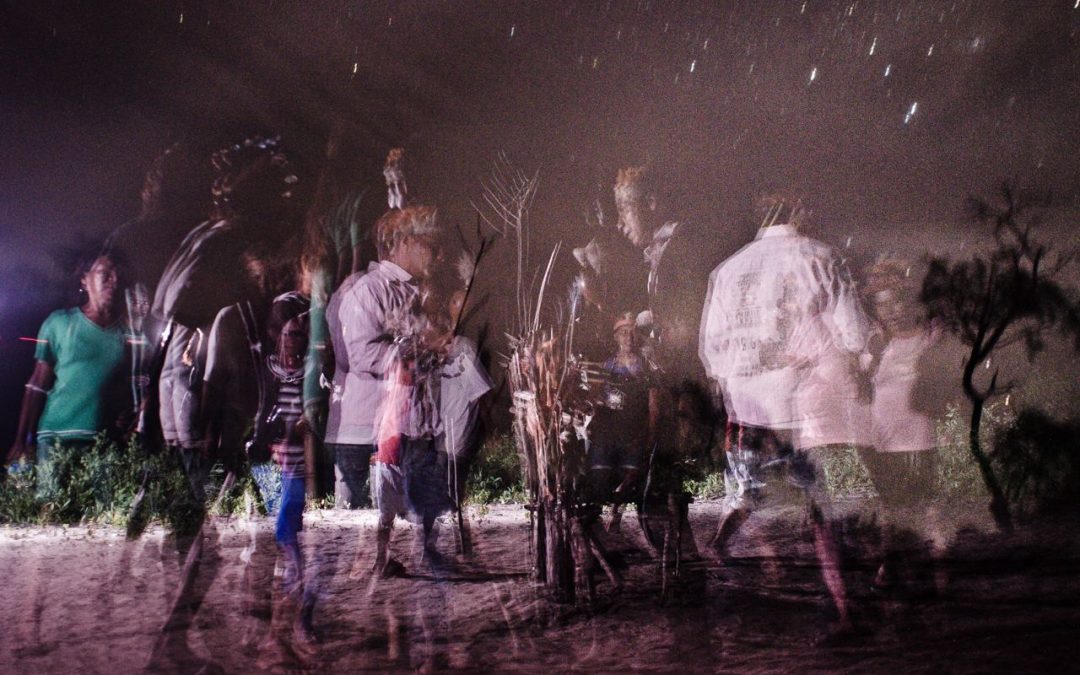
29/Oct/2021
We are a Brazilian Indigenous delegation heading to Glasgow, Scotland, as representatives of the yearnings and bearers of urgent messages from more than 305 Indigenous Peoples of Brazil.
We are men and women, descendants of millennial generations of guardians of the biomes of South America, and we are united with the original peoples from every corner of our Mother Earth.
On all continents, native peoples fight to protect their lands and guarantee the right to live to all species. Our struggle is for our lives and our territories, for the defence of the last ancestral lands and to confront the climate crisis on our planet. Our struggle is for the healing of the Earth. Therefore, we reiterate the urgency of the demarcation and land tenure rights of our territories.
Indigenous Land is a guarantee of the future for all humanity. Our relationship with territory is not one of ownership, exploitation, expropriation or appropriation, but one of respect and management of a common good, which serves all humanity as barricades to the extractive dynamics that cause the climate crisis. Until today – based on reports from the UN and several research institutes with the highest reputation that western science can demand – it is we, Indigenous Peoples, who are the most responsible for the preservation of the biomes of the planet.
As we leave our villages and cross the Atlantic Ocean to the most important climate convention that global governance has instituted, we carry in our bags our traditional knowledge and the authority to affirm that our territories are oases of biodiversity and models of climate solution. Our culture and our knowledge are originally environmentalist, even before the term was invented.
Many of those who listen to us today are unaware of all the effort we put into this mission. We have shaped and protected our biomes at the price of the blood of millions of our relatives. The genocide of the native peoples, the persecution of the defenders of our territories and the illegal capture of our lands, is the greatest and most widespread crime that humanity has produced throughout its history. This is a continuing and present crime, which we denounce in all the instances we occupy.
It is fundamental that the world understands that there is no solution for the healing of Mother Earth that does not have its feet on the ground. Connecting with the earth, feeling its needs, understanding its cycles and its imbalances is fundamental to reverse the damage caused in recent centuries by the thirst for an irresponsible, unequal and ecocidal accumulation and disposal behavior.
What we feel in our villages, territories protected at such cost, are the devastating symptoms of the climate apocalypse. The indigenous genocide and the continuous expropriation of our territories by legislative onslaughts and predatory interests is a clear sign that our lands are the last Reserves of the Future. The massacre of indigenous peoples is an omen of the irreversible devastation that is claiming victims in forests, fields, savannahs, and all biomes throughout the world. If left unchecked, it will bring all living beings to a tragic, painful and unjust end.
To the authorities and experts meeting now in Glasgow, we ask them to take real action for the protection of our territories and to work tirelessly for a fairer and less polluting production system for all societies.
We are going to Glasgow to warn the world once again, and on this occasion with even more gravity: humanity is leading the destiny of us all to chaos and death! Our Mother Earth is exhausted.
The future of the planet and the species that inhabit it depend on our global capacity to cooperate to defend and strengthen indigenous peoples and local communities, to ensure the security of traditional territories in the face of predatory economic interests, and to create and promote effective climate solutions based on nature and the communities that protect it.
Therefore, we stand against false solutions based on technological innovations designed from the same developmental and productivist logic that causes climate change. We criticize solutions that do not recognize indigenous peoples and local communities as central to the defence of forests, the reduction of deforestation and fires, and as essential to ensure that we reach the stated goal of keeping global warming below 1.5 degrees Celsius.
We hope that this message will reach global leaders, businessmen and civil society organizations present at COP26, vibrate in their hearts, and reforest their minds!
LAND BACK!
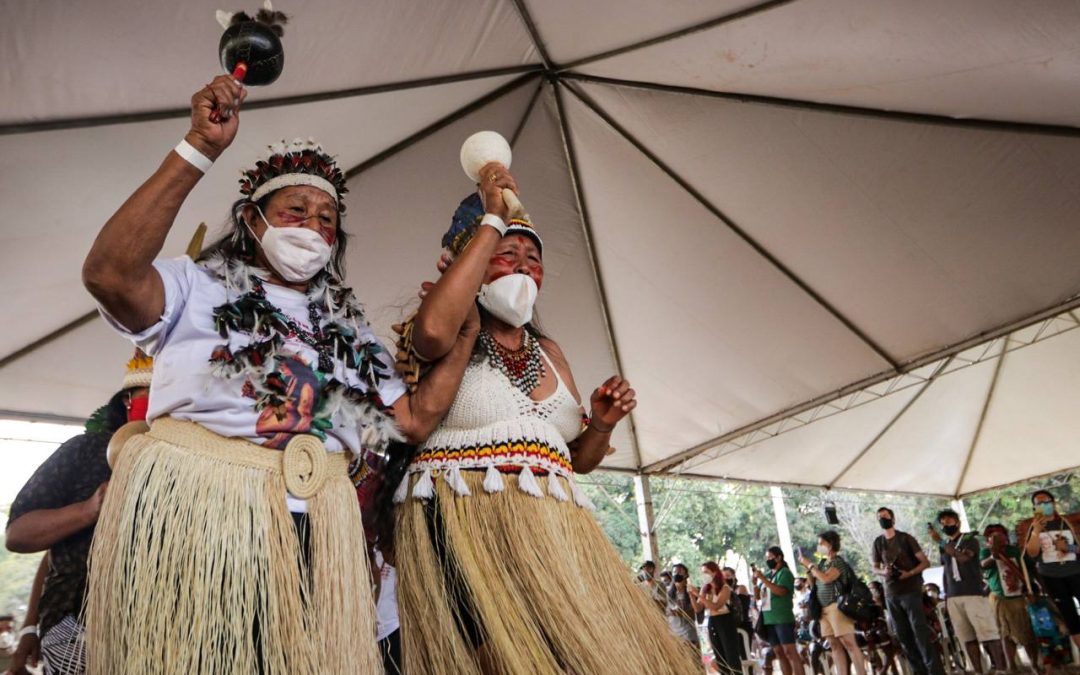
08/Sep/2021
The session has just began and the expectation is that the Court will guarantee the original rights of peoples; in Brasilia and in the territories, the indigenous are following the judgment
By Anmiga’s press office
More than 4,000 ancestral women warriors, gathered in the II National March of Indigenous Women, are mobilized to follow the judgment in the Supreme Court (STF) that will define the future of the demarcation of indigenous lands in Brazil.
Scheduled to start at 2 pm on Wednesday (8), the session of the Supreme Court has been resumed with the reading of the votes of the Justices. The previous session, held last Thursday (2), ended with the manifestation of the Attorney General’s Office (PGR) on the case. The week before, Minister Edson Fachin read the initial report, the parties involved in the process made their oral arguments and the amici curiae – “friends of the court” made their contributions to the understanding of the case.
“Today is a decisive day for the future of the trial, because it enters the stage of the votes of the ministers, starting with the vote of the reporting minister, Edson Fachin, then opening for the other ministers”, explains Samara Pataxó, legal advisor of the Articulação dos Povos Indigenous peoples of Brazil (Apib).
The prime minister to present his vote is the rapporteur of the case. Only then will the other votes be presented, in ascending order of seniority – from the newest to the oldest -, that is, from Minister Nunes Marques to Minister Gilmar Mendes (dean), with the President of the Court, Minister Luiz, voting last Flow
There is no way to predict how the session will take place. There is the possibility of a request for views, which can be made by any of the ministers; if it occurs, the judgment will be suspended and must be re-arranged. “This would be a bad scenario for the indigenous peoples, but there is also the possibility of the ministers asking to anticipate their votes, which would be a good scenario for the judgment to be able to proceed, even if one of the ministers up front asks for a view”, explains Samara.
What is certain is that “indigenous women will be on the front line to bury once and for all the thesis of the milestone thesis, during the II National March of Indigenous Women”, reaffirms the coordination of the National Articulation of Indigenous Women Warriors of Ancestrality (Anmiga ).
In defense of their original rights, indigenous peoples mobilized to accompany the trial in Brasília and in the territories. In the capital, for reasons of care and to protect the lives of women, children and elderly women, the more than 4,000 women who build the II National March of Indigenous Women will follow the trial on a screen mounted in the main tent of the camp installed in the space. of Funarte. The expectation is that the Court will guarantee the original rights of peoples and refute the thesis of the temporal thesis.
Know the disputed theses
The Supreme Court is analyzing the repossession filed by the IMA – Environment Institute (IMA), of Santa Catarina, against the Xokleng people, referring to the Ibirama-Laklãnõ IT, where the Guarani and Kaingang peoples also live. In 2019, the Court recognized the “general repercussion” of the case, that is, the decision will serve as a guideline for the federal management and all instances of Justice with regard to demarcation procedures.
At the center of the dispute are two theses: on the one hand the thesis of the so-called milestone thesis, defended by ruralists and which restricts indigenous rights, and on the other the defense of the original right and traditionality of indigenous occupation as a criterion for the demarcation of indigenous lands .
According to the restrictive thesis of the milestone thesis, indigenous peoples would only have the right to demarcate the lands that were in their possession on October 5, 1988, the date of promulgation of the Constitution. In addition to bringing the burden of proof of the dispute for their territories to the communities, the thesis ignores and at the same time legitimizes the history of expulsions and violence suffered by indigenous peoples before the date. This thesis is defended by the most backward sectors of agribusiness, as well as other sectors interested in exploring resources in indigenous lands.
Opposed to the milestone thesis is the “theory of the indigenous”, enshrined in the Federal Constitution of 1988. According to it, the indigenous right to land is original, that is, it predates the formation of the Brazilian State itself, and the public power is only responsible for declaring your recognition. Without making no mention about any milestone thesis, the 1988 Constitution establishes the traditionality of indigenous occupation as the only criterion for demarcation. This thesis is defended by indigenous peoples and organizations, indigenists, environmentalists and human rights organizations.
Indigenous peoples claim “our history did not begin in 1988, and our struggles are centuries old.
Permanent mobilization
Between August 22nd and 28th, six thousand indigenous people, from 176 peoples from all regions of the country, were present in Brasília, gathered in the “Luta pela Vida” camp to follow the trial in the Supreme Court and fight in defense of their rights, protesting also against the anti-indigenous agenda of the Bolsonaro government and the National Congress.
In order to continue following the trial, the indigenous people decided to continue their mobilization in Brasília and in the territories. Thus, around 1,200 indigenous leaders, representing their peoples, remained in the capital permanently and now the group joins forces with the II National March of Indigenous Women.
In Brasília or in the territories, “we are seeking to guarantee our territories, those that preceded us, for present and future generations, defending the environment, this common good that guarantees our ways of life as humanity. In addition to being a mere physical resource, it is also home to the spirits of forests, animals and the waters of life as a whole, source of our ancestral knowledge”, reinforces the March coordination.
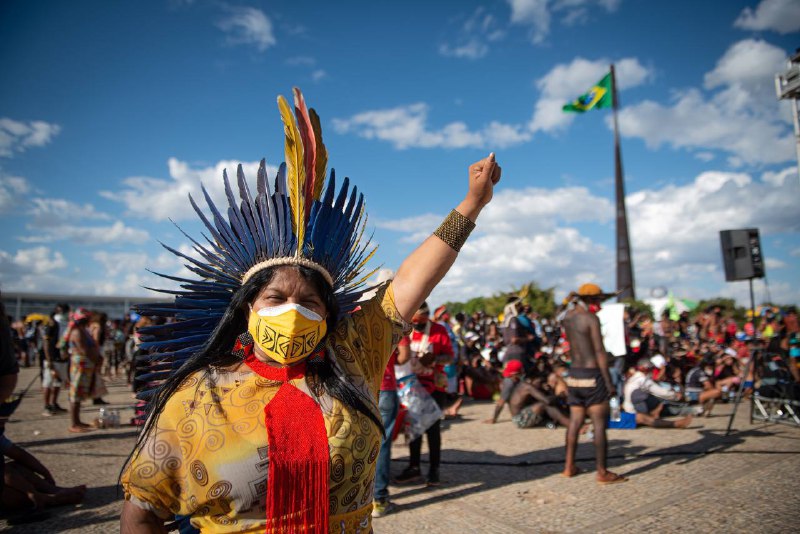
06/Sep/2021
Foto: Matheus Alves
“Narrative”, the favorite word of president Jair Bolsonaro’s followers, is defined by the dictionary as a “prose text whose characters figure fictional, imaginary situations”. And it defines the badly said speech delivered by Bolsonaro last week about the trial of the Milestone thesis (Marco Temporal) by the Brazilian Supreme Court: “If the understanding of the past changes, we will immediately be to demarcate, by judicial force, another area equivalent to the Southeast region as indigenous land. Agribusiness is over”. How is it possible to fit so much fiction into just two sentences?
Ruralists even paid full-page advertisements on newspapers to help promote the presidential delusion; but, in the real world, if the Supreme Federal Court decides to bury it once and for all, it will not be modifying any “past understanding”. In fact, it was the Federal Attorney General’s Office (AGU) who did that, during the Michel Temer (MDB) government, when it issued opinion 001/2017.
The indigenous leader Sonia Guajajara – Picture by Noemie Olive – 11.nov.19 / Reuters
The Milestone thesis (Marco Temporal) — which determines that only indigenous peoples who were already occupying their lands on the date of promulgation of the Constitution in 1988 could claim possession of those lands – was not provided for by law. The AGU used the vote of former minister Ayres Britto in the trial on the ratification of the Raposa Serra do Sol Indigenous Territory (TI) to justify its position.
In 2009, the court had ruled that the Indigenous Land should be demarcated “on an continuous territory”; therefore, non-indigenous possessions would figure outside the delimited area. Only Britto’s vote makes a precise mention of the time frame. The Supreme Court was called again, in 2013, to judge appeals against the decision. And, in addition to reinforcing the precedent decision, it determined that it would not have binding effect. In fact, the thesis was not even applied in the Raposa Serra do Sol process, since there were non-indigenous possessions within the limits of its territory that dated from the beginning of the 20th century and were annulled. This is not history, it is historical fact.
Indigenous protest against changings in the policy of land demarcations
Bolsonaro promised that Brazil would return to what it was 50 years ago, but the approval of the milestone thesis would make the country retrocede to the colonial period. A permission act of April 1st, 1680, sanctioned by the law in 1775, already established that in “land granted to private individuals, the rights of indigenous, its primary and natural lords, would always be reserved”. The president will also not be required to do anything “immediately”: the article 67 of the Transitional Provisions Act of the 1988 Constitution prior to a period of five years for all Indigenous Lands to be demarcated. The state is already 28 years late.
Today, indigenous lands occupy 13.8% of the national territory. It seems a lot, but the proportion is lower than the world average: 15%, according to a study published in the magazine “Nature Sustainability”. If compared to the area occupied by rural properties, we lose by far: 41%. There are 421 Indigenous Lands already approved, totaling 1,066 million km² and 303 in the demarcation phase, or 110,000 km². More than 600,000 people live into them. Meanwhile, 51,200 latifundios, or 1% of the properties, occupy 20% of Brazil, according to data extracted from the Diário Oficial da União, IBGE, Funai, Instituto Socioambiental and the MapBiomas project.
Mobilização nacional
Also for comparison purposes, the Ibirama-La Klãnõ Indigenous Lad, claimed by the Environment Institute of Santa Catarina, whose judgment has been declared as “general repercussion” by the Brazilian Supreme, has 370 km² and 2,057 indigenous people depending on it; the Fazenda Nova Piratininga, in Goiás, which belongs to three businessmen, occupies 1,350 km²
There is nothing to justify the fat eyes over our lands: only in the Amazon, there are 510,000 km² of unallocated area, which can be used for production. Indigenous Lands are essential to contain deforestation – only 1.6% of the loss of native vegetation in the country occurred within their limits between 1985 and 2020 – and they store 28.2 billion tons of CO 2 in the Amazon, 33% of the total.
Without indigenous lands, the planet will heat up and the sky will stop raining. We are not the ones who can end agribusiness, but the agribusiness can do it by itself.
Via Folha de São Paulo
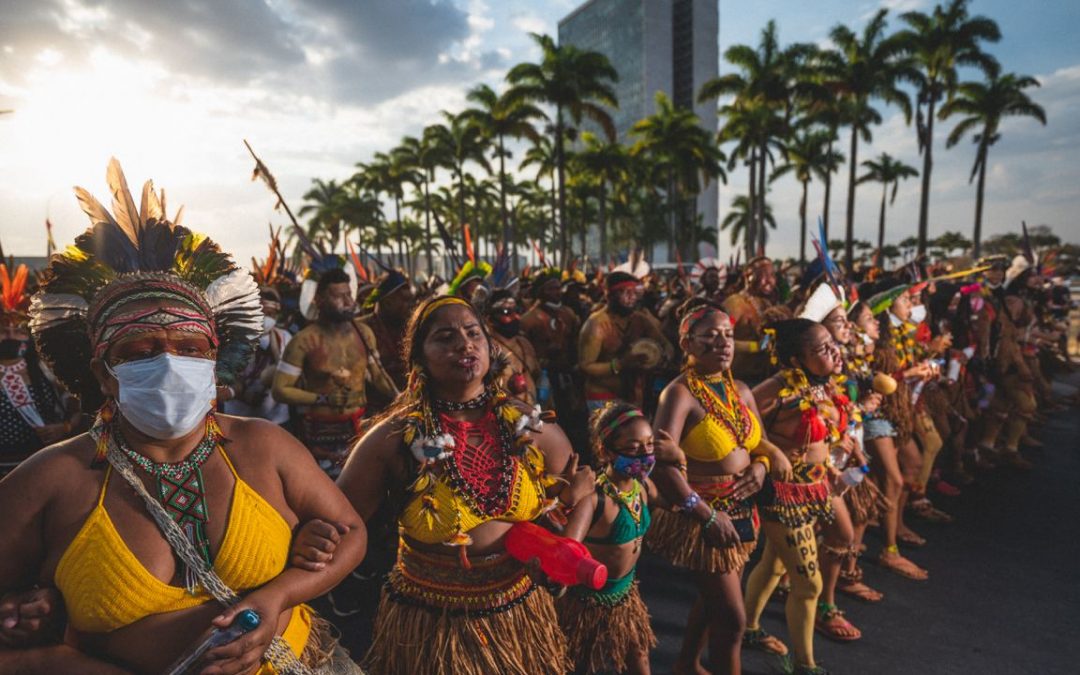
03/Sep/2021
The event will gather about 4,000 women from 150 peoples, from all regions of the country and will continue the mobilizations of the indigenous movement in defense of their rights in the federal capital
Between the 7th and 11th of September, the National Articulation of Indigenous Women Warriors of Ancestrality (Anmiga) holds the Second National March of Indigenous Women, in Brasília. With the theme “Original women: Reforesting minds for the healing of the Earth’, it is expected the participation of about 4,000 women, from more than 150 peoples, coming from all biomes of Brazil, during the 3 days of activities, which take place in the space of the National Arts Foundation (FUNARTE).
“We are seeking to guarantee our territories, those that preceded us, for present and future generations, defending the environment, this common good that guarantees our ways of life as humanity. In addition to being a mere physical resource, it is also home to the spirits of forests, animals and the waters of life as a whole, source of our ancestral knowledge”, reinforces Anmiga’s statement on the march.
The mobilization was carried out for the first time in 2019, and it took place virtually in 2020 due to the Covid-19 pandemic. The sanitary protocols of the second march reinforce all existing and recommended norms for combating coronaviruses.
According to the organization of the march, the women’s delegations were guided to prioritize the participation of people who had completed their immunization cycle against Covid-19, with at least two doses of the vaccine, or with the unique dose. The use of mask during the activities is mandatory and testing will be carried out upon the arrival of people at the event.
The march health team includes indigenous health professionals in partnership with the Brazilian Association of Collective Health (Abrasco), the Oswaldo Cruz Foundation (Fiocruz), the Indigenous Health Clinic from the University of Brasília (Asi/UNB), the Health Department of the Federal District with the University Hospital of Brasília (HUB).
Permanent Mobilization
“We state that indigenous women will be on the front line to bury once and for all the ‘milestone thesis’, during the 2nd march of indigenous women”, emphasizes the Anmiga coordination.
Since August 22, more than six thousand indigenous people, from 176 peoples, from all regions of the country, were present in Brasília, gathered in the “Luta pela Vida” camp, which is currently the largest mobilization in the history of the indigenous movement. Headed by the Articulação dos Povos Indígenas do Brasil (Apib), in association with all its regional organizations, the indigenous people are following the judgment by the Supreme Court (STF) that will define the future of the demarcation of Indigenous Lands and also protest against the anti-indigenous agenda of Bolsonaro government and within the National Congress.
After the beginning of the trial, on August 26, and the announcement that it would be resumed this Wednesday (1/09), the indigenous people decided to keep the mobilization in Brasília and in the territories. Around 1,200 indigenous leaders, representing their peoples, remained in Brasília, and the “Luta pela Vida” camp was transferred to a new location, Funarte.
The group will continue to follow the trial and join forces with the 2nd March of Indigenous Women in a proposal for permanent mobilization.
Schedule
September 7th will be dedicated to welcoming the delegations in Brasilia, with orientation and testing activities for Covid-19. The National Forum of Indigenous Women starts on Wednesday, the 8th, and the entire mobilization will follow the return of the judgment in the Supreme Court at 2 pm (GMT-3).
On Thursday (9), the March of Indigenous Women will head to the Três Poderes Square, and on the 10th the end of the mobilization activities will count on the launch of the mobilization “Reflorestarmentes”. All activities can be followed on the website: anmiga.org
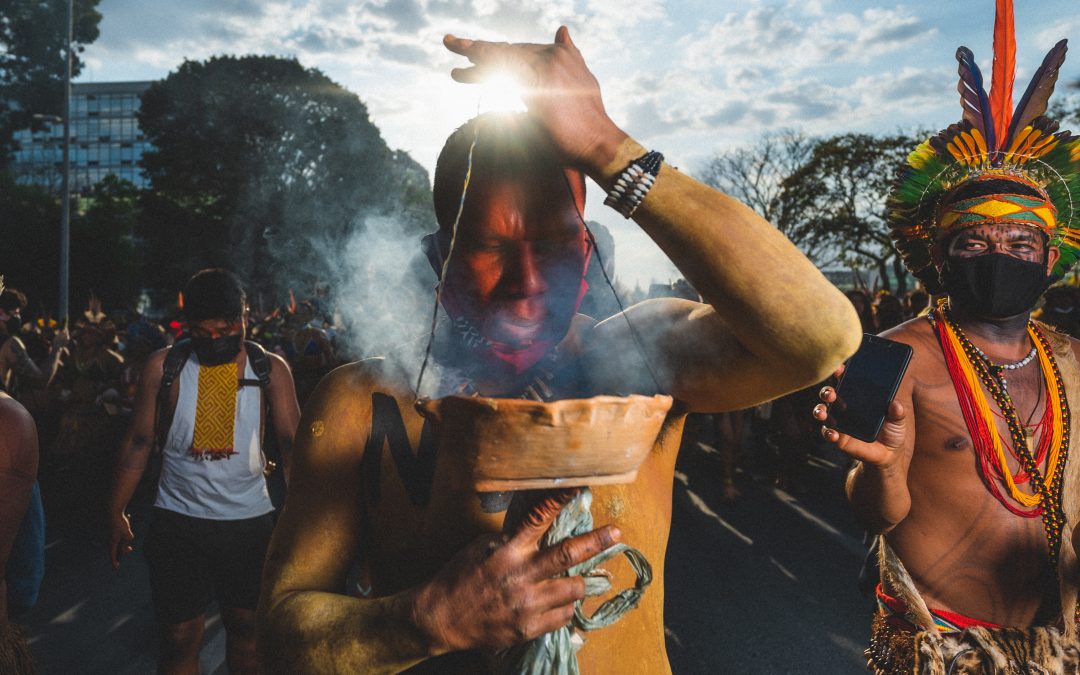
31/Aug/2021
Foto @cicerone.bezerra
The session is scheduled to start at 2 pm (GMT-3), with oral statements by the parties involved in the process; indigenous peoples are mobilized in Brasília and in the territories to follow the judgment
Scheduled to start at 2:00 PM (GMT-3) on Wednesday, September 1st, the Brazilian Supreme Court (STF) resumes the judgment on the “milestone thesis” for the demarcation of Indigenous Lands (TIs), suspended last Thursday ( 26) after the presentation by the Justice Edson Fachin of his report. Still last Thursday, the President of the Court, Luiz Fux, confirmed the case would be resumed as the first item on the Court schedule, as it configures a “very relevant” issue and must have a decision this week or in the “following days”.
With the report already presented, the session will be resumed with the argumentation by the parties of the process: from the Attorney-General of the Union (AGU), representing the Union; lawyers from the Xokleng community, from TI Ibirama-LaKlãnõ (SC), target of the original action; the Institute for the Environment of the state of Santa Catarina (IMA), which proposed the action; in addition to the Attorney General’s Office (PGR), which is required to manifest itself in lawsuits involving indigenous issues. AGU, PGR and the parts of the process will each have 15 minutes of speech.
Then, there should be 34 speeches by the amici curiae – “friends of the Court”, which are organizations that deal directly with the issues under analysis, and, from this position, may bring relevant points of view to support the Justices to make their decision.
21 amici curiae are registered to speak in favor of the rights of indigenous peoples. They are indigenous lawyers, including Apib’s attorney – Eloy Terena, and indigenists, socio-environmental and human rights organizations and institutions; and 13 contrary, linked to agribusiness representations and entities. Each speech will last five minutes.
“Reading the report is already an extremely important step. It was a detailed report by the Justice Edson Fachin, which brings up the major issues involved in the procedural dispute in this extraordinary appeal: the possession links regarding the areas of traditional indigenous occupation, in the light of article 231 of our Federal Constitution”, highlights Rafael Modesto, legal advisor to the Indigenous Missionary Council (Cimi) and lawyer for the Xokleng people in the case.
The oral presentations by the parties, the AGU, the PGR and the amici curiae are expected to take almost the entire Wednesday afternoon. In the sequence, the first minister to read his vote should be the rapporteur, Edson Fachin.
The native peoples, indigenous organizations and indigenists hope the rapporteur, Edson Fachin, who has already presented his vote when the process was in the Virtual Plenary, will “bring a vote similar or identical to that he had already presented, against the ‘milestone’ thesis’. The thesis is rejected by indigenous peoples, support organizations and civil society, artists, intellectuals, society as a whole.
We defend the original law, associated to the ‘thesis of indigenato’, which is the will of the original constituent of 1988”, reinforces the Xokleng people’s lawyer.
After Fachin, the other nine ministers must submit their votes. They can still request a new suspension of the process to analyze it better, the so-called request for “views”.
Disputed theses
The Court will analyze the repossession action filed by the government of Santa Catarina against the Xokleng people, referring to the TI Ibirama-Laklãnõ, where the Guarani and Kaingang peoples also live. The case received, in 2019, the status of “general repercussion”, which means that the decision will serve as a guideline for the federal administration and all instances of Justice with regard to demarcation procedures.
At the heart of the dispute are two theses:
The so-called “milestone” thesis, a ruralist thesis that restricts indigenous rights. According to this interpretation, considered unconstitutional, indigenous peoples would only have the right to the lands that were in their possession on October 5, 1988, date of the Constitution promulgation. This thesis is defended by companies and economic sectors that are interested in exploring and appropriating indigenous lands.
Opposed to the milestone thesis is the “theory of indigenato”, enshrined in the Federal Constitution of 1988. According to it, the indigenous right to land is “original”, that means it predates the formation of the Brazilian State itself, regardless of a date specific proof of land ownership (“milestone”) and even the administrative procedure of territorial demarcation. This thesis is defended by indigenous peoples and organizations, indigenists, environmentalists and human rights organizations.
“Our history did not begin in 1988, and our struggles are millenial, that is, they have persisted since the Portuguese and successive European invaders landed in these lands to take over our territories and their wealth”, the indigenous movement reaffirms in a note published in the Saturday (28). Indigenous people also ensure that they continue “resisting, claiming respect for their way of seeing, being, thinking, feeling and acting in the world”.
Indigenous mobilization
Last week, six thousand indigenous people from 176 peoples from all regions of the country were gathered in Brasilia in the “Struggle for Life” camp to follow the trial by the Supreme Court and to demand their rights, also protesting against the anti-indigenous agenda implemented by Bolsonaro’s government and by the National Congress, in the largest indigenous mobilization in the last 30 years.
After the beginning of the trial and the forecast that it would be resumed this Wednesday (1st), the indigenous people decided to keep the mobilization in Brasília and in the territories. Thus, around a thousand indigenous leaders, representing their peoples, remained in Brasília, and the “Struggle for Life” camp was transferred to a new location.
In the early afternoon of this Wednesday (1st), the indigenous peoples who remain in Brasília will leave the camp marching towards the Praça dos Três Poderes, where they will follow the trial by the STF.
Following the sanitary protocols to combat Covid-19, the group will remain until September 2nd and later join forces with the Second March of Indigenous Women, which takes place between September 7th and 11th.
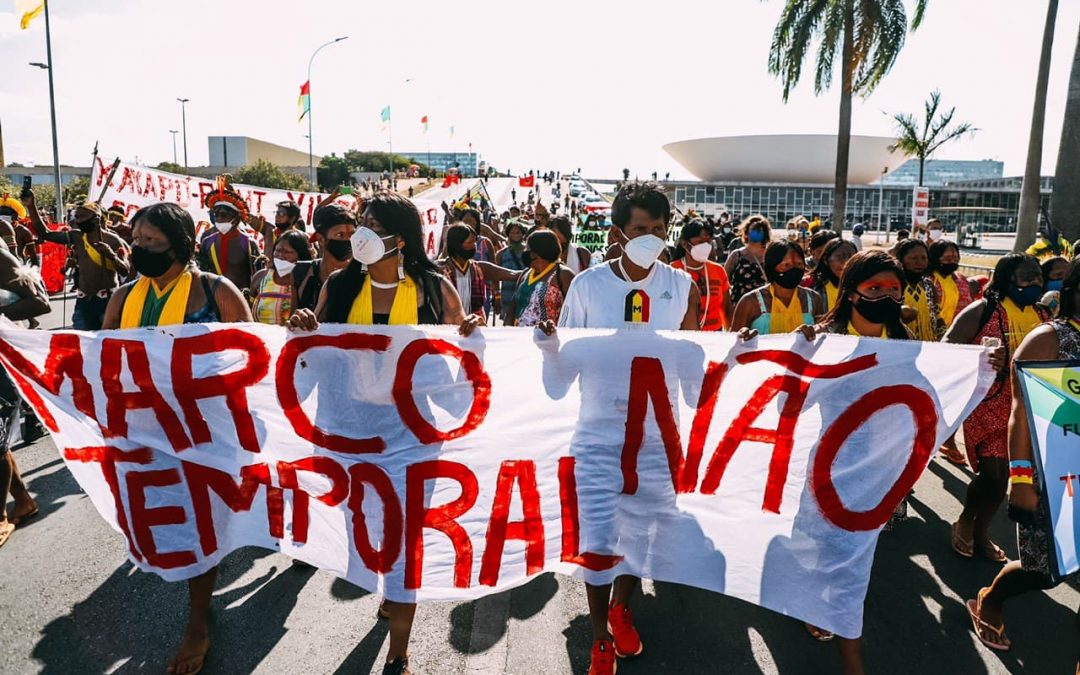
26/Aug/2021
Foto: Raissa Azeredo | Aldeia Multietnica
On the day the Federal Supreme Court (STF) resumes the trial that will define the future of the demarcation of indigenous lands in Brazil, understand once and for all what the Milestone thesis is
Today, the Federal Supreme Court resumes the trial of the Xokleng case, in an Extraordinary Appeal filed by the Government of Santa Catarina. What is in the hands of the 11 ministers of the STF is the future of the demarcation of indigenous lands in Brazil. This is because the main issue involved in this judgment is the Temporal Framework, a thesis that also permeates some bills being voted on in the National Congress.
Indigenous peoples have been repeating for quite some time that, if validated, the Milestones thesis could seriously compromise the process of demarcation of indigenous lands in Brazil, and even serve as an excuse to cancel demarcation processes that have already been concluded.
But after all, do you know what the Milestone Thesis (Marco Temporal) is?
The Milestone thesis is a legal thesis that restricts the constitutional rights of indigenous peoples. In this interpretation, defended by ruralists and sectors interested in the exploitation of traditional lands, the indigenous peoples would only have the right to demarcation of the lands that were under their possession on October 5, 1988 – the promulgation date of the Brazilian Constitution. Alternatively, if they were not in possession of the land, they would have to prove the existence of a judicial dispute or material conflict on the same date of 5 October 1988.
The thesis is perverse because it legalizes and legitimizes the violence to which the peoples were subjected until the promulgation of the 1988 Constitution, especially during the Military Dictatorship. Furthermore, it ignores the fact that, until 1988, the indigenous peoples were under the guardianship of the State and did not have the autonomy to judicially fight for their rights. For all these reasons, the indigenous peoples have been saying in demonstrations and mobilisations: “Our history does not begin in 1988!
Why is the STF debating this issue today?
The debate on the Milestone thesis arrived at the STF as a thesis presented by the Government of Santa Catarina in the Extraordinary Appeal (RE) 1.017.365. The object of the case is a repossession suit filed by the Environmental Institute of Santa Catarina (IMA) against the National Indian Foundation (FUNAI) and the Xokleng indigenous people, involving an area claimed by the Ibirama-Laklanõ Indigenous Territory. The territory in dispute was reduced throughout the 20th century and the indigenous people have never stopped claiming it. The area has already been identified by anthropological studies by Funai and declared by the Ministry of Justice as part of their traditional land.
Why is this trial central to the future of indigenous peoples in Brazil?
In a decision on 11 April 2019, the plenary of the STF unanimously recognised that this case has “general repercussion” status. This means that the decision made in that case will serve to fix a reference thesis for all cases involving indigenous lands, in all instances of the Judiciary from now on.
And does this decision affect many people?
Besides the peoples that inhabit the Ibirama-Laklanõ Indigenous Lands, the object of the lawsuit, this decision will impact dozens of land demarcation cases and territorial disputes over Indigenous Lands that are currently in the courts. There are also many legislative measures that seek to remove or relativize the constitutional rights of indigenous peoples. By admitting the general repercussion, the STF also recognises that there is a need for a definition of the theme.
What is at stake?
Ultimately, what is at stake is the recognition or denial of the most fundamental right of indigenous peoples: the right to land. Indigenous peoples have an interdependent relationship with their lands, as their cosmologies link their very existence to the connection with the land. Furthermore, it cannot be ignored that those who defend the Milestone thesis intend, in reality, to expel the original occupants of the lands in order to destroy and exploit them to exhaustion. And this directly impacts the ecological and climatic balance of our country and world.
What consequences could this trial have for the indigenous peoples?
If the STF reaffirms the original character of indigenous rights and, therefore, definitively rejects the thesis of the temporal milestone, hundreds of conflicts throughout the country will have a path open to their solution, as well as dozens of lawsuits could be immediately resolved. The 310 indigenous lands that are stalled at some stage in the demarcation process would, in theory, no longer have any barriers for their administrative processes to be concluded.
On the other hand, if the STF opts for the anti-indigenous thesis of the temporal milestone, it will end up legalising the usurpations and violations that occurred in the past against the indigenous peoples. In this case, a flood of other decisions annulling demarcations can be foreseen, with the consequent rise of conflicts in pacified regions and the worsening of conflicts in areas already under attack.
This decision could also encourage a new process of invasion and dispossession of demarcated lands – a situation that is already underway in various regions of the country, especially in the Amazon region.
In addition, there are references to isolated indigenous peoples who have not yet been confirmed by the State, that is, they are still being studied – a lengthy procedure, due to the non-contact policy. If the time limit of 1988 is approved, many lands of isolated peoples will not be recognized, opening up the possibility of the extermination of these peoples.
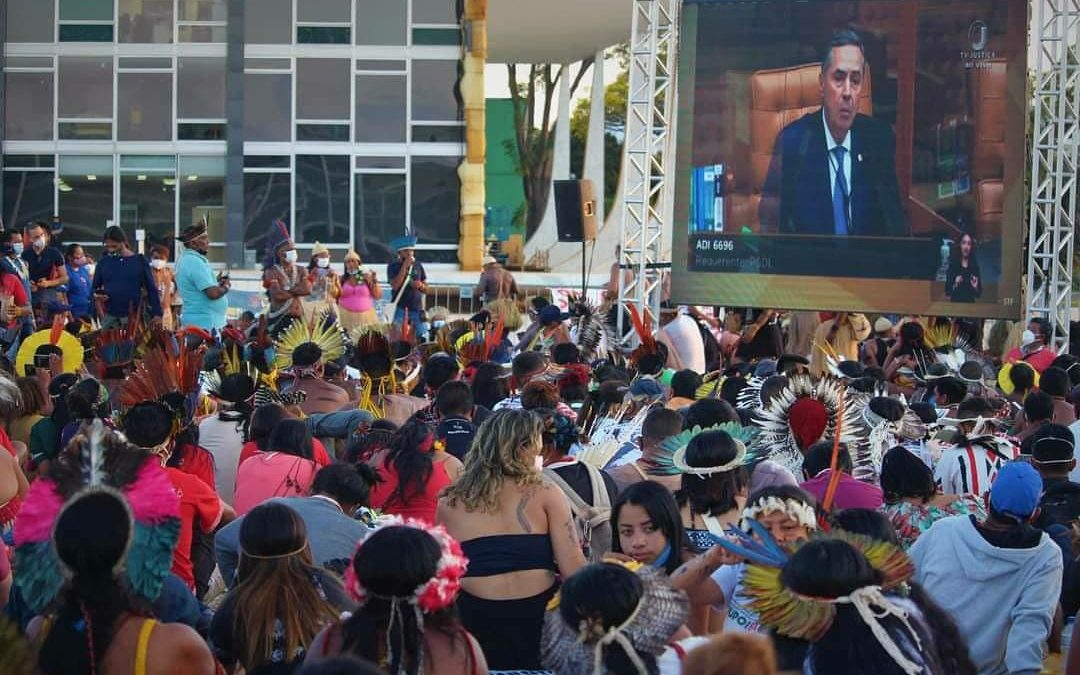
25/Aug/2021
Photo: Daniela HubertyComin
For the fourth time in two months, the STF does not judge a case that could define the future of indigenous peoples; the trial must begin on Thursday 26
The trial of the general repercussion on demarcations of indigenous lands, which was scheduled to enter the agenda of the Federal Supreme Court (STF), on Wednesday, 25, was postponed to tomorrow, Thursday, 26. This is the fourth time in two months that the process that can define the future of indigenous peoples has been put on the agenda and not judged by the Supreme Court.
The mobilisation of the indigenous peoples continues, with the expectation that the process will finally be voted on, that the STF reaffirm the constitutional rights of indigenous peoples and rule out any possibility of restriction or reversal of what was guaranteed by the Federal Constitution of 1988.
The approximately 6,000 indigenous people who have been in Brasilia, in the Struggle for Life camp, since 22 August, continue mobilising to follow the trial in the Supreme Court and protest against the anti-indigenous agenda in the National Congress and the federal government.
History
On June 11, the trial even began in virtual plenary session, but was suspended by a request for a “highlight” by Minister Alexandre de Moraes, one minute after it began. The trial was rescheduled for June 30, but the ministers did not get to start due to lack of time and was postponed to June 31. That same week, the analysis of the case was rescheduled by the president of the Court, Minister Luiz Fux, who included the tria in the agenda for 25 August.
Now, the forecast is that the process is voted on Thursday (26). The session begins at 2pm (Brasília time) and the Supreme Court will analyse the repossession action filed by the government of Santa Catarina against the Xokleng people, regarding the Ibirama-Laklãnõ IT, where the Guarani and Kaingang peoples also live. In 2019, the STF gave “general repercussion” status to the process, which means that the decision made in this case will serve as a guideline for the federal approach and all instances of Justice with regard to demarcation procedures.
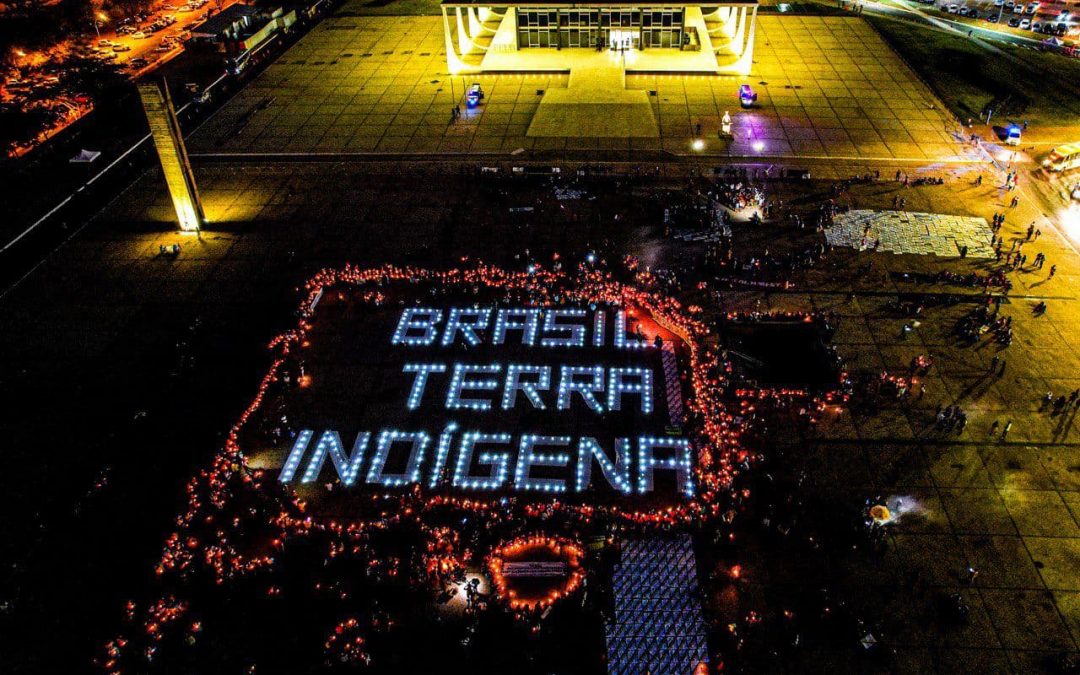
24/Aug/2021
Photo: Scarlett Rocha
More than 6,000 indigenous people came to Brasilia at one of the most serious moments ever experienced by indigenous peoples, to demand respect and a guarantee of their rights.
For 521 years, we, the Indigenous Peoples of Brazil, have lived and experienced the meaning of struggle. We struggle to survive, to be respected by a State that despises our existence, usurps our traditional territories, and relegates us to a condition of sub-citizenship. The legacy of the colonial past is persistent and violent, and today it gains support and new impetus under the management of Jair Bolsonaro, the president of the Republic who elected us as priority enemies even before his inauguration.
The history of the indigenous movement in Brazil is a history of struggle and resistance, constant mobilization and innovation, and the search for the construction of bridges and alliances between our 305 peoples, who live in all regions of the country. Such ethnic, geographic, cultural, and linguistic diversity, besides being an inestimable richness, also becomes a challenge when one seeks unity in the struggle. To overcome this difficulty, which is reinforced and exploited by enemies who artificially try to divide and forge disputes and oppositions among our relatives, we renew our alliance from our shared ancestry.
The struggle for life, the motto of the camp that now gathers 6.000 indigenous people in Brasilia, is established as a necessity and an urgency for us, original people, as soon as the perverse and genocidal face of the colonialist project was revealed. We have lived in a state of alert since the first European foot stepped on this land, even before it was named Brazil.
It is symptomatic that after five centuries of colonization, we still have to cry out in defense of our lives, as much as our ancestors had to do in the past. The struggle is still the same, but throughout all these years we have accumulated survival technologies and articulation strategies.
We have learned since the time of our ancestors and from our elders that when the enemy tries to subdue us by force and hatred, the most powerful way to confront the aggressions is to unite. This is what the indigenous movement did in the constituent process of 1988, with the participation of leaders of diverse peoples in the construction of an agenda of rights affirmation. We managed to include part of our demands in the text of the Federal Constitution, which gave us an unprecedented institutional support to advance in the struggle for public policies that would contemplate our specific needs and especially guarantee the demarcation of our indigenous lands.
This, however, was not enough to convince the Brazilian State and a nation – that has not yet pulled out the deepest roots of racism from its culture – that fully respecting us as citizens is not a favor – it is an obligation. Both the Federal Constitution and international treaties to which Brazil is a signatory are categorical in affirming the State’s obligation to demarcate indigenous territories and protect our physical integrity.
Faced with this unending need to reaffirm that our lives matter, when we hold a national mobilization with a historic number of participants, in the midst of the most serious pandemic that the world has faced in centuries, there are two conclusions that run deepest in our hearts.
The first is that the situation is still unfavorable and urgent, and this is one of the factors that brings us massively to Brasilia. Our people can no longer bear to tell stories of death, of fire, of pain, of destruction. We want to tell other stories, we want to talk about our wealth, our cultures, our joy.
And this brings us to the second conclusion: the clear perception that the indigenous movement in Brazil has reached a level of maturity, organicity, and strength that places us definitely as subjects of our own history. Our protagonism is based on centuries of struggle by our ancestors, and on the clarity that there is no more room for silencing. The world is seeing and hearing what is happening to our peoples, and it is we, relatives, who are in control of our narrative!
The record of relatives and numbers of peoples mobilized in Brasilia becomes, therefore, a message to the world, and especially to those forces that insist on trying to violate us: we will not be silenced! Our strength is greater than ever! We are 6 thousands in Brasilia, and we represent all the relatives that continue the struggle in our territories. We are 6 thousands who represent the millions of ancestors who have been erased from history. We are 6 thousands who represent the future of the indigenous peoples of Brazil!
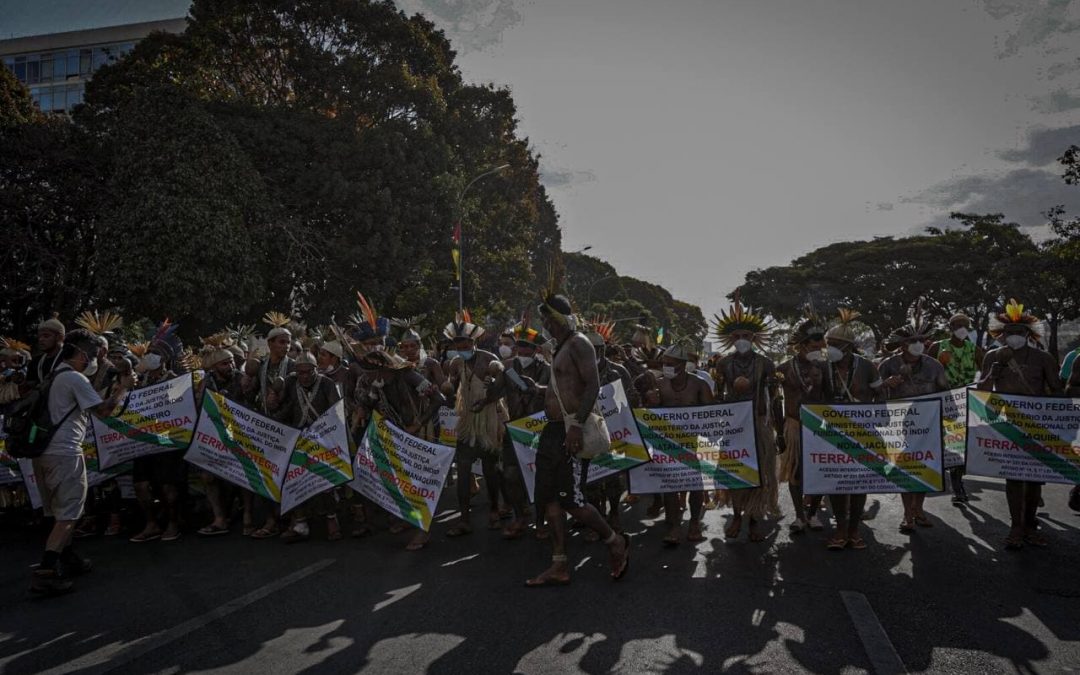
24/Aug/2021
Photo: Scott hill
The international community demands from Brazilian institutions respect for the rights of indigenous peoples and rejects the Milestone thesis, which will be judged by the Supreme Federal Court (STF)
The struggle of the indigenous peoples of Brazil for the respect of their lives and territories has gained relevant international support every day. The Articulation of the Indigenous Peoples of Brazil (Apib) understands the importance of seeking the attention of the world and occupying all possible instances to guarantee respect for their rights, especially in a domestic conjuncture in which Brazilian institutions, which should look after the welfare and guarantee of indigenous peoples rights, are converted into threatening spaces.
Since the beginning of the Bolsonaro government, the attitude of the Brazilian State towards the indigenous peoples has become a policy of death and destruction. The hard-won public policies have been hastily discontinued, indigenous institutions, such as FUNAI, have been politically occupied and their institutional objectives have been distorted. The State has systematically omitted its constitutional duties to protect indigenous peoples, when it has not revealed itself to be an enemy.
In this scenario, international support is even more relevant. The support of partners, international agencies and multilateral bodies draws the attention of the global community to the scenario of constant threats and violence that the indigenous peoples live through in Brazil. Far beyond mobilising international solidarity, however, this movement also provokes Brazilian institutions to move in defence of the native peoples.
Thus, Apib and its regional organisations have received with great satisfaction the support of various international institutions in recent days, especially after the start of the Struggle for Life camp in Brasilia. “We are carrying out the biggest mobilisation of our lives, in Brasilia, because it is our future and that of all humanity that is at stake. Speaking of the demarcation of indigenous lands in Brazil is to speak of guaranteeing the future of the planet with solutions to the climate crisis,” reinforces Sonia Guajajara, executive coordinator of Apib.
On the first day of the mobilisation, the coordination of Apib and representatives of the Yanomami and Munduruku peoples were visited by the Progressive International, an international network of NGOs, political parties, trade unions and other institutions fighting for human rights, in a demonstration of international support. The committee received copies of the International Complaints Dossier launched by APIB last week, as a tool to denounce the anti-indigenous agenda that takes over Brazilian institutions under the Bolsonaro government.
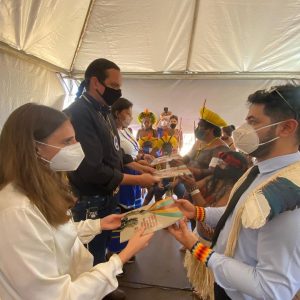
In the coming days, representatives of APIB have an intense agenda of meetings with embassies and diplomatic representations in Brasilia, occasions in which they will present the International Complaints Dossier and dialogue about the necessary support of foreign states to stop the anti-indigenous agenda advancing in Brazil. The meetings began yesterday, with a visit to the Norwegian Embassy, where they were received by Ambassador Nils Martin Gunneng and programme officer Kristian Bengston. This morning, they were received by the French Ambassador, Brigitte Collet.
UN and OAS reinforce the fight against the Milestone thesis
Yesterday (23), the Inter-American Commission on Human Rights (IACHR), an organ of the Organization of American States (OAS), and the UN Special Rapporteur on the rights of indigenous peoples, Francisco Cali Tzay, spoke out against the Milestone thesis, which is being debated by the Federal Supreme Court (STF) within the scope of Extraordinary Appeal (RE) 1.017.365.
The RE deals with a repossession action filed by the state of Santa Catarina against the Xokleng people, regarding the Ibirama-Laklãnõ Indigenous Land (IT), where Guarani and Kaingang indigenous people also live. In 2019, the STF gave “general repercussion” status to the case, which means that the decision made in this case will serve as a guideline for the federal management and all the Justice instances with regard to demarcation procedures. The trial, therefore, will affect the future of all indigenous territories in Brazil.
The UN Rapporteur asked the Supreme Court (STF) to guarantee the rights of indigenous peoples to their lands and territories, and to reject a legal argument promoted by commercial agents in order to exploit natural resources on traditional indigenous lands, referring to the Milestone thesis.
“If the STF accepts the so-called Milestone thesis in its decision on land demarcation later this month, it could legitimize violence against indigenous peoples and intensify conflicts in the Amazon forest and other areas,” said the Rapporteur.
The IACHR expressed its concern over the legal thesis of the “Milestone thesis” and warned that it could have serious effects on the collective property rights of indigenous and tribal peoples in Brazil.
The manifestation published yesterday on the IACHR website addresses in particular the STF requesting the Court to “adopt the necessary measures to review and modify the provisions of the judicial orders or directives, such as the “Milestone thesis”, which are incompatible with the parameters and international obligations regarding the human rights of indigenous and tribal peoples”.
For the OAS body, the application of the Milestone thesis “contradicts international and inter-American human rights standards, in particular the American Convention on Human Rights and the American Declaration on the Rights of Indigenous Peoples. In particular, because it does not take into consideration the countless cases in which indigenous peoples were forcibly displaced from their territories, often with extreme violence, which is why they were not occupying their territories in 1988.”











